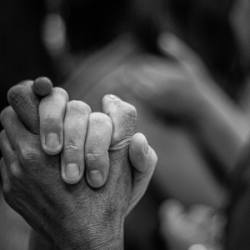
Seven years ago I wrote a series on Nonviolence. Much has changed for me since then. Originally, my understanding of nonviolence had been deeply influenced by those who define nonviolence in a way that is rooted in self-sacrifice. I’ve grown to understand nonviolence differently. I’ve grown to see that this way of defining nonviolence is itself violent. A healthier, more life-giving form of nonviolence is needed. This is significant enough for me that I believe a rewrite of that series seven years ago on nonviolence is important. In the words of Katie Cannon from the introduction of Delores Williams’ classic Sisters in the Wilderness, “Theologians need to think seriously about the real-life consequences of redemptive suffering, God-talk that equates the acceptance of pain, misery, and abuse as the way for true believers to live as authentic Christian disciples. Those who spew such false teaching and warped preaching must cease and desist.” I have so much gratitude for Cannon and others for helping me see this. I have thought seriously in response to womanist and feminist critiques of defining nonviolence in ways that are rooted in self-sacrifice and the myth of redemptive suffering. It is as a result of listening to these critiques that I feel that this revision is needed.
Let’s begin
In Matthew’s Gospel we read these words:
“You have heard that it was said, ‘An eye for an eye, and a tooth for a tooth.’ But now I tell you: do not take revenge on someone who wrongs you. If anyone slaps you on the right cheek, let him slap your left cheek too. And if someone takes you to court to sue you for your shirt, let him have your coat as well. And if one of the occupation troops forces you to carry his pack one mile, carry it two miles. When someone asks you for something, give it to him; when someone wants to borrow something, lend it to him. You have heard that it was said, ‘Love your friends, hate your enemies.’ But now I tell you: love your enemies and pray for those who persecute you, so that you may become the children of your Father in heaven. For he makes his sun to shine on bad and good people alike and gives rain to those who do good and to those who do evil. Why should God reward you if you love only the people who love you? Even the tax collectors do that! And if you speak only to your friends, have you done anything out of the ordinary? Even the gentiles do that! You must be perfect—just as your Father in heaven is perfect.” (Matthew 5:38-48)
When it comes to nonviolence in general, it seems to me that Western, Americanized Christianity has lost its way. Maybe we’ve forgotten what the road we’re supposed to be on even looks like. Since Jesus spoke the above words two millennia ago, followers and non-followers alike have read them and struggled to interpret and apply them in life-giving ways.
I want to offer an interpretative lens that I refer to as Self-Affirming Nonviolent Resistance.
The first word I want to focus on is “Nonviolent.”
Today, many Christians say that Jesus’ teaching on nonviolence is only for certain groups, certain time periods, or certain cultural circumstances. Even so, it is obvious that Jesus taught a form of nonviolence.
Further, too often Christians who do teach nonviolence teach a self-sacrificing form of nonviolence rather than a self-affirming form. I once did this myself because, during the first 300 years of Christian history, many Christians interpreted Jesus’ teaching as self-sacrificing nonviolence too. But listening to marginalized communities and their experiences with nonviolence opens up new understandings of what Jesus may have originally taught.
I am fully aware that some supporters of Renewed Heart Ministries who are wonderful Christians have a different opinion from me on this topic and do not subscribe to nonviolence. Thank you for tracking with us on this series anyway. It would be easier for you to focus on things that don’t pull you out of your comfort zone. Through this series, we will look at this subject again, secure and confident in our love, respect, and consideration of each other.
I want to also speak to those who subscribe to self-sacrificial nonviolence. Our social structures already deny justice and full humanity to so many people. They’re forced to deny their selves. For this sector of society, I don’t believe Jesus would teach them to further sacrifice themselves in a society that already requires that. I believe Jesus’ form of nonviolence gave marginalized people a way to affirm themselves, affirm their humanity, to hold on to their selves in a world that would either prefer they did not exist or demand that they “go back to where they came from.”
Nonviolence, even self-affirming nonviolent resistance, is a disposition, an attitude, and a way of life where the means and the ends are aligned. We do not choose the way of violence in order to maintain peace: Jesus’ way of peace disrupted unjust systems. Jesus’ way arrived at peace through resistance, by establishing distributive justice for all, especially those our communities push to the edges and margins.
Today we have overwhelming evidence that the early followers of Jesus were nonviolent. Over the church’s first three centuries, those who held onto nonviolence drifted into more self-sacrificing forms of it. Yet their testimony for some form of nonviolence is still relevant and challenging to Christians today who reject nonviolence completely, regardless of its form. The U.S. Christian church has become something that early Christians wouldn’t recognize. The statements that follow are representative of the voices in Christianity for its first 300 years.
“We (Christians) no longer take up sword against nation, nor do we learn war any more, but we have become the children of peace.” —Origin
“And shall the son of peace take part in the battle when it does not become him even to sue at law? And shall he apply the chain, and the prison, and the torture, and the punishment, who is not the avenger even of his own wrongs?” —Tertullian
“Anyone who has the power of the sword, or who is a civil magistrate wearing the purple, should desist, or he should be rejected.”—Hippolytus
“Rather, it is better to suffer wrong than to inflict it. We would rather shed our own blood than stain our hands and our conscience with that of another.” —Arnobius
“It makes no difference whether you put a man to death by word, or rather by the sword since it is the act of putting to death itself which is prohibited.”—Arnobius
“When God forbids killing, he doesn’t just ban murder, which is not permitted under the law even; he is also recommending us not to do certain things which are treated as lawful among men.”—Lactanius
In some of these statements, we see love and nonviolence defined by the early church leaders as self-sacrifice, the willingness to suffer for the benefit of someone else. We’ll discuss this at greater lengths in this series when we listen to feminist and womanist voices and their critique. For now, Marcus J. Borg sums up the concern of self-sacrifice in his book The Heart of Christianity:
“Oppressed people, in society and in the family, have often been told to put their own selves last out of obedience to God. When thus understood, the message of the cross becomes an instrument of oppressive authority and self-abdication.” (p. 112)
Defining nonviolence as self-sacrifice for the oppressed has proven itself to be a violent form of nonviolence.
In this series, I hope to offer an alternative view.
I interpret Jesus’ teachings on nonviolence similarly to Walter Wink who states that Jesus’ nonviolence gave oppressed communities, a way to “assert [their] own humanity and dignity . . . refuse to submit or to accept the inferior position [and] expose the injustice of the system.” (in Jesus and Nonviolence: A Third Way)
But today most of Christianity either rejects Jesus’ nonviolence outright or embraces nonviolence in a way that leaves marginalized and exploited people passive in the face of injustice and harms them.
There are alternatives.
In this series, we will consider Jesus’ sayings on the subject of nonviolence. We will then address frequently asked questions about applying nonviolence. Lastly, we will listen to objections and critiques, not from those who would use violence to dominate or subjugate others, but from communities for whom a form of nonviolence has left them further oppressed, exploited and subjugated.
My hope is that we will arrive at a form of nonviolence that’s not only faithful to the Jesus story but that’s also life-giving and that bears the fruit of liberation, too.
This series is going to be a wonderful journey of discovery for us, regardless of where we begin. Whether we agree at the end of this series or not, our understanding will be greater as we explore what we believe and why.
We’ll begin next week. For now, it will be enough to begin contemplating what this passage holds for us today:
“You have heard that it was said, ‘An eye for an eye, and a tooth for a tooth.’ But now I tell you: do not take revenge on someone who wrongs you. If anyone slaps you on the right cheek, let him slap your left cheek too. And if someone takes you to court to sue you for your shirt, let him have your coat as well. And if one of the occupation troops forces you to carry his pack one mile, carry it two miles. When someone asks you for something, give it to him; when someone wants to borrow something, lend it to him. You have heard that it was said, ‘Love your friends, hate your enemies.’ But now I tell you: love your enemies and pray for those who persecute you, so that you may become the children of your Father in heaven. For he makes his sun to shine on bad and good people alike and gives rain to those who do good and to those who do evil. Why should God reward you if you love only the people who love you? Even the tax collectors do that! And if you speak only to your friends, have you done anything out of the ordinary? Even the gentiles do that! You must be perfect—just as your Father in heaven is perfect.” (Matthew 5:38-48)













